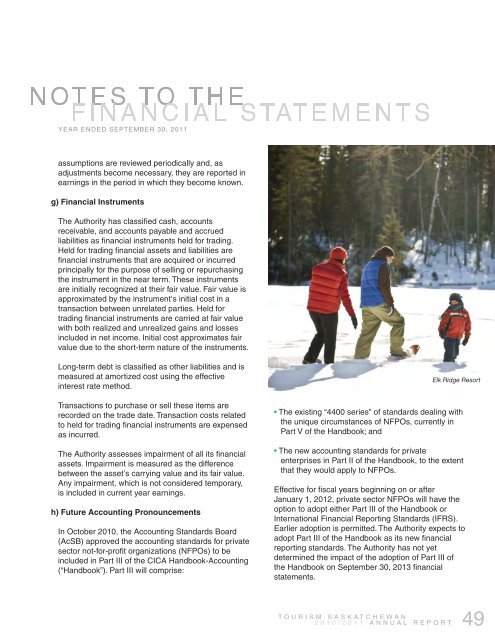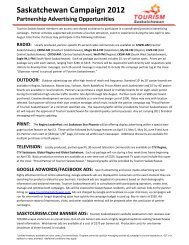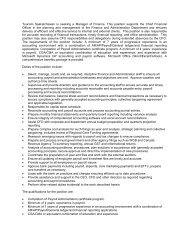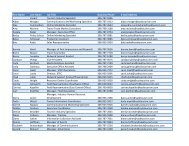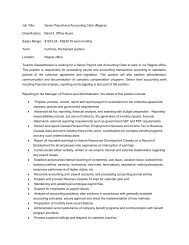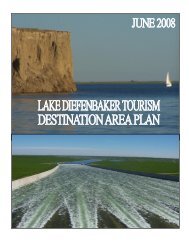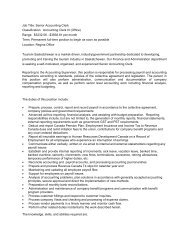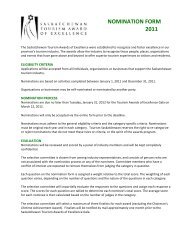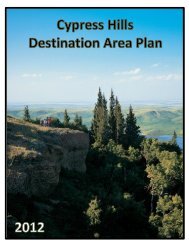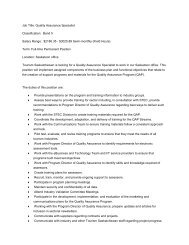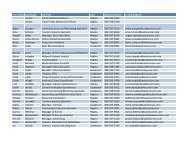Tourism Saskatchewan - IndustryMatters.com
Tourism Saskatchewan - IndustryMatters.com
Tourism Saskatchewan - IndustryMatters.com
You also want an ePaper? Increase the reach of your titles
YUMPU automatically turns print PDFs into web optimized ePapers that Google loves.
YEAR ENDED SEPTEMBER 30, 2011<br />
assumptions are reviewed periodically and, as<br />
adjustments be<strong>com</strong>e necessary, they are reported in<br />
earnings in the period in which they be<strong>com</strong>e known.<br />
g) Financial Instruments<br />
The Authority has classified cash, accounts<br />
receivable, and accounts payable and accrued<br />
liabilities as financial instruments held for trading.<br />
Held for trading financial assets and liabilities are<br />
financial instruments that are acquired or incurred<br />
principally for the purpose of selling or repurchasing<br />
the instrument in the near term. These instruments<br />
are initially recognized at their fair value. Fair value is<br />
approximated by the instrument’s initial cost in a<br />
transaction between unrelated parties. Held for<br />
trading financial instruments are carried at fair value<br />
with both realized and unrealized gains and losses<br />
included in net in<strong>com</strong>e. Initial cost approximates fair<br />
value due to the short-term nature of the instruments.<br />
Long-term debt is classified as other liabilities and is<br />
measured at amortized cost using the effective<br />
interest rate method.<br />
Transactions to purchase or sell these items are<br />
recorded on the trade date. Transaction costs related<br />
to held for trading financial instruments are expensed<br />
as incurred.<br />
The Authority assesses impairment of all its financial<br />
assets. Impairment is measured as the difference<br />
between the asset’s carrying value and its fair value.<br />
Any impairment, which is not considered temporary,<br />
is included in current year earnings.<br />
h) Future Accounting Pronouncements<br />
In October 2010, the Accounting Standards Board<br />
(AcSB) approved the accounting standards for private<br />
sector not-for-profit organizations (NFPOs) to be<br />
included in Part III of the CICA Handbook-Accounting<br />
(“Handbook”). Part III will <strong>com</strong>prise:<br />
Elk Ridge Resort<br />
• The existing “4400 series” of standards dealing with<br />
the unique circumstances of NFPOs, currently in<br />
Part V of the Handbook; and<br />
• The new accounting standards for private<br />
enterprises in Part II of the Handbook, to the extent<br />
that they would apply to NFPOs.<br />
Effective for fiscal years beginning on or after<br />
January 1, 2012, private sector NFPOs will have the<br />
option to adopt either Part III of the Handbook or<br />
International Financial Reporting Standards (IFRS).<br />
Earlier adoption is permitted. The Authority expects to<br />
adopt Part III of the Handbook as its new financial<br />
reporting standards. The Authority has not yet<br />
determined the impact of the adoption of Part III of<br />
the Handbook on September 30, 2013 financial<br />
statements.<br />
49


